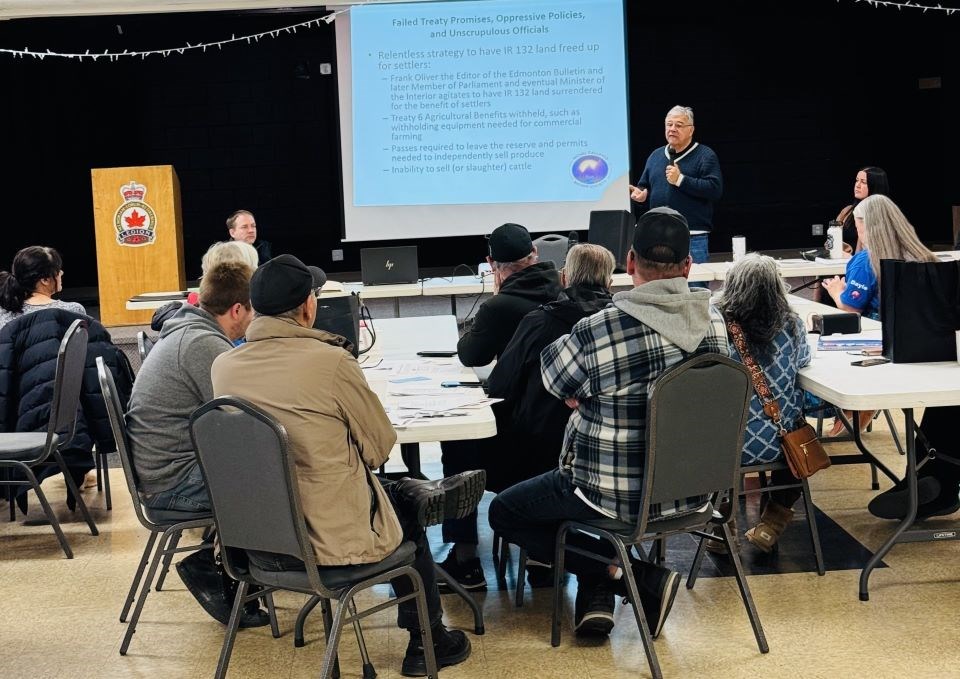The Michel Callihoo Nation Society (MCNS) brought together descendants of the former Michel Band during a Hinton event on Nov. 9.
This is part of the society’s efforts to have Canada recognize the Michal Band, which was completely enfranchised under the Indian Act in 1958.
“The enfranchisement of Michel Band No. 472 stripped us of our Treaty rights, Lands, languages and identities,” said MCNS director Carey Beaudin in a statement. “MCNS hosted this event to help give the descendants of Michel Band No. 472 their inherent human and Treaty rights back.”
Prior to 1985, enfranchisement removed a person’s status as an Indian under federal law. An individual lost all associated benefits, and their descendants were not considered Indian and could also not get these benefits.
Originally located northwest of Edmonton near St. Albert and covering 40 square miles, the Michael Band was enfranchised in two waves. In 1928, 10 families gave up their Indian status due to poor living conditions on reserve, restrictions caused by the Indian Act and to protect their children from the residential school system.
In 1958, the Michel Band was completely enfranchised, the first and only time a band was enfranchised as a collective in the 20th century.
“The government policy at the time was to slowly chip away at the land and at the reserve because they wanted it for different reasons – agriculture, resources, those kinds of things,” said Kim Beaudin, MCNS board member.
Following enfranchisement, Michel Band members and their descendants spread out across Canada.
Some descendants have since regained their Indian status as individuals, while many are awaiting the passage of Bill C-38, which would address collective enfranchisement. The bill passed first reading in December 2022 but has yet to receive second reading.
MCNS is currently engaged in exploratory discussions with Indigenous Services Canada in pursuit of band creation and has been hosting events in hopes of reconnecting with descendants.
Beaudin said Hinton was a good place for reaching out to descendants there and other communities such as Jasper, Grande Cache, Edson and Marlboro.
“When we first got there, I wasn’t sure who was all going to come, because it looked pretty sporadic, but then about 30 people came out, and I was quite pleased, actually,” he said.
The event was originally scheduled for late July but was postponed due to the Jasper wildfire. Beaudin was worried about the loss of momentum but was ultimately satisfied with the turnout.
“People we hadn't seen at different meetings before [came],” he added. “There were even people that knew me, for example, when I went to high school there when I was really young. They knew me when I was a kid, both my sister and I [and] even knew my nickname, which I thought was quite, quite funny to go back that far.”
The event gave descendants an opportunity to sign a statement of intent, a confidential method to share information about an individual’s connection to the Michel Band.
According to MCNS, signing the statement indicates to the federal government that a descendant is requesting to be placed on the initial band list as a member of the Michel Callihoo Nation.
More than 1,000 Michel Band descendants have signed statements of intent.
Jacinthe Goulet, spokesperson for Indigenous Services Canada, stated in an email that they couldn’t provide details about specific discussions regarding band creation and recognition but noted there were three ways a new band can be created under the Indian Act.
These include dividing a current band into two or more bands, merging two or more current bands into one band and creating an entirely new band made up of a group of previously unrecognized people.
“In recent years most new bands have come into being through the division of an existing band,” Goulet said. “Band creation is a complex process that often takes a number of years to complete.”
She added the overall process is dictated by legal, administrative and legislative requirements, but each process is also a collaborative effort between the federal government and any community involved, reflecting the affected community’s history, situation and aspirations.
Beaudin acknowledged much work needed to be done but emphasized the need to rebuild their community.
“We lost our connections to our family; all that support, that all was gone,” he said. “We want to rebuild that: rebuild our connections and rebuild our relationship with the Crown.”
Descendants are encouraged to reach out to MCNS or attend one of their events.
Editor's note: Bill C-38 will address collective enfrancisement, not Bill C-28.




